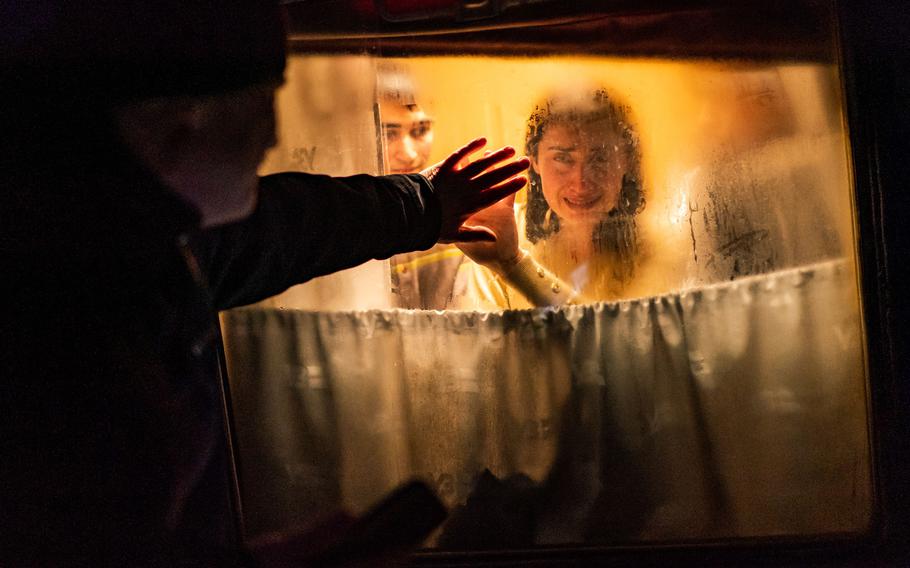
George Keburia says goodbye to his wife Maya and children as they board a train to Lviv at the Odessa train station in Odessa, Ukraine on March 5, 2022. (Salwan Georges/The Washington Post)
As the Russian invasion enters its third week, most Ukrainians want to keep up the fight, according to a new poll.
Conducted by Kyiv based-Info Sapiens, the poll, released Wednesday, offers the clearest snapshot yet of Ukrainian public opinion as Russian forces continue to shell and encircle cities in a war that analysts say is bent on toppling Ukraine’s pro-European government to replace it with pro-Russian proxies.
The fighting has killed and injured hundreds, according to a conservative United Nations count, and thousands according to official Ukrainian figures. Millions more civilians have fled across borders or to perceived safer places in Ukraine.
Russian President Vladimir Putin reportedly expected to be warmly welcomed by Ukrainians - and as the war drags on, public opinion appears to continue to harden against him, according to the latest poll. The study was commissioned by the British Research Agency ORB International and carried out using a random sampling of cellphones from March 3 and 4.
Most notably, 67% of Ukrainians polled — 78% of men and 59% of women — said they were “willing to put up armed resistance” to stop Russia’s advance into Ukraine. A smaller subset, 14% of people, said they were “strongly unwilling” to fight back with arms.
Eighty-eight percent of Ukrainians said they support President Volodymyr Zelensky, who has defiantly remained in the capital to rally Ukrainian and international support, despite reportedly facing repeated assassination attempts. Zelensky was elected in 2019 on an anti-corruption platform, and before the Feb. 24 invasion had faced waning support.
Publics often rally around leaders during crises. But when it comes to some of Putin’s key demands on Ukraine, which he has dangled as possible concessions to end the war, a majority of Ukrainians remain opposed to accepting them.
Info Sapiens found that 79% of Ukrainians reject Moscow’s recognition last month of the Donbas region of eastern Ukraine as part of Russia, even if doing so would end the fighting. Pro-Russia separatists have been battling the Ukrainian government for control of this area since 2014, when a Ukrainian uprising ousted its pro-Russian president.
Similarly, 75% oppose Putin’s official recognition of Crimea, which Moscow annexed in 2014. Both Crimea and the occupied Donbas and neighboring Luhansk region were excluded from the poll.
One of Putin’s key demands in the lead-up to the invasion was for NATO to pledge never to accept Ukraine into the western military alliance, which Moscow perceives as an existential threat. Info Sapiens found that 56% of Ukrainians opposed a ban on NATO membership as a guarantee for ending the war, compared to 30% who would accept it.
A smaller subset, 46%, opposed the full implementation of the Minsk agreements reached in 2014 and 2015 by Moscow and Kyiv to end the fighting in eastern Ukraine. From the start, Ukraine was unhappy with the accords, which it said it was effectively forced into signing and were stacked in Russia’s favor.
Though opposition to the agreements was lower than other possible offers, support was not relatively higher: just 23% of Ukrainians said they would accept the Minsk agreements, with another 31% marking themselves as “don’t know.”
Russia and Ukraine have deep ties, with many cross-border families, friends and businesses going back generations. But the Info Sapiens poll offered a snapshot of how divides may be deepening: 66% of Ukrainians surveyed said “ordinary Russians are to be blamed for armed aggression,” while 30% disagreed.
Media in Russia is banned from calling Putin’s attack on Ukraine a war or invasion; instead, state media euphemistically says it is a “special military action,” one it falsely claims was needed to “denazify” Ukraine and stop its genocide of Russian speakers.
Accurate polling in Russia is always difficult to ascertain: An all-out assault on independent media in recent days has made it even more challenging.
Still, there are some useful snapshots. A Russian national survey carried about between Feb. 28 and March 1 by an independent Russian research firm found that 46% of respondents fully supported the war, compared to 23% who opposed it.
The poll also found a clear generational divide, with support highest among older Russians and lowest among those aged 18 to 24. Far-reaching international sanctions on and boycotts of Russian leaders, banks, and businesses imposed since the invasion began have greatly impacted ordinary citizens.
Polls conducted in the fog of war in Ukraine are also limited in what they can capture with so many Ukrainians on the run or without consistent means of communication. Over 2 million mainly women and children have fled Ukraine over the last two weeks. Most men between the ages of 18 to 60 are barred from leaving so they can be conscripted to fight.
Of Ukrainians who remain, 51% reported being afraid of running out of food and 38% said they feared not having water.
Fifty-one percent told Info Sapiens that they stayed because “it’s my home and I won’t leave.”